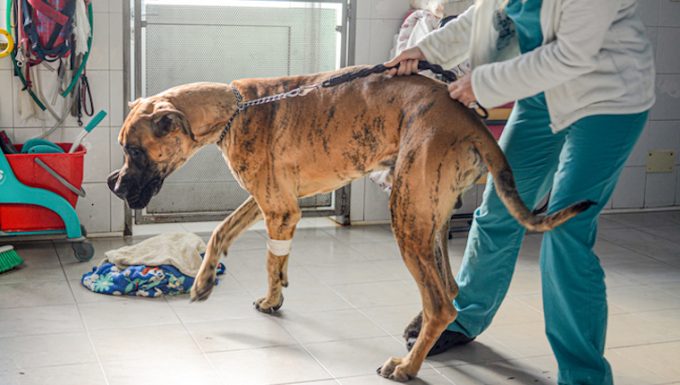Joint cancer in dogs is a disease of the joints and connective tissue. Thankfully, the condition can be rare, but unfortunately it is aggressive.
The condition usually spreads through the shoulder blades, elbows, and knees.
The condition is most common in larger breeds of dog and less common in smaller pups.
Technically, the condition is also known as synovial sarcoma.
If you see the signs of the condition in your dog, then get to a veterinarian for a proper diagnosis and treatment.
Here’s what you should know about the symptoms, causes, and treatments for the condition.
Symptoms of Joint Cancer in Dogs
The condition produces a number of symptoms. For example, some of the most common symptoms include:
- Losing weight
- Limping
- Losing appetite
- Fever
- Breathing problems
- Swelling
Causes of Joint Cancer in Dogs

The cause of the condition is unfortunately unknown. However, the following breeds seem to develop it the most:
- Irish Setter
- Rottweiler
- Saint Bernard
- German Shepherd
- Boxer
- Golden Retriever
- Great Dane
Treatments for Joint Cancer in Dogs
Firstly, your vet will ask about your dog’s symptoms. Secondly, your vet will ask about your dog’s full medical history. This will include breed-specific problems.
Thirdly, a full physical examination will be carried out. Blood and urine tests will also be taken.
Ultimately, imaging techniques like X-rays can diagnose the condition. Additionally, a biopsy is usually taken.
Unfortunately, amputation is often the main course of treatment. This is to remove the affected limb or body part.
While recovering, your dog will need pain medication. As always, if your vet prescribes your dog any medicine, make sure to stick to the correct dose and frequency instructions. Also, complete the full course of medicine.
Finally, exercise and even trips to poop and pee outside will need to be limited and taken easy. Your vet can help give guidance on how to keep your dog comfortable.
Have you ever cared for a dog who suffered from this condition? How did your vet help your dog recover? Let us know in the comments section below.









